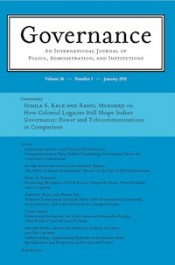China: Seeking transparency in a smoggy climate
By Jane Whitehead. Media reports of the worst air pollution ever recorded in China’s capital Beijing, over the weekend of January 12-13 2013, have added urgency to a question that shadows China’s economic rise: how will the evolving Chinese state balance economic growth with increasing social pressure for better environmental management?
Yeling Tan offers clues to possible answers in her article “Transparency without Democracy: The Unexpected Effects of China’s Environmental Disclosure Policy,” recently published by Governance. FREE ACCESS to the article. Conventional wisdom, said Tan in an interview, “is that transparency, accountability and democracy all move in the same direction.”
Her article re-examines the relationship among these concepts in the non-democratic context of contemporary China, and highlights some unexpected routes to improved outcomes, like pressure from multinational corporations (MNCs) that now use pollution data to monitor their Chinese suppliers.
“Information disclosure by itself won’t automatically lead to change,” said Tan, a doctoral candidate in the public policy program at Harvard’s Kennedy School of Government. In the article she analyzes the complex pathways through which the Chinese government’s 2008 Open Environmental Information (OEI) measures have impacted stakeholders such as citizens, businesses, and non-government organizations (NGOs) and MNCs.
Tan’s research for the article included three trips to China from 2009-2011, during which she interviewed academics, government officials, representatives of environmental NGOs and journalists to build a detailed picture of how the OEI regulations are being implemented in various cities and townships.
National policies on pollution control such as the OEI measures introduced by the central Ministry of Environmental Protection (MEP) in 2008 are often neutered by China’s decentralized governance system, writes Tan. Economic growth is an overriding priority for most localities, leading to close ties between local government and industries. These in turn weaken the bargaining position of the local Environmental Protection Bureaus charged with implementing the OEI measures. The more aggressively pro-growth the municipality, the patchier the implementation of the transparency regulations is likely to be.
Tan cites the case of the Fuguo tannery company in Dachang township in Shanghai to show the limitations of disclosure-based governance in China, and the important role that MNCs can play. In the mid-2000s, following residents’ complaints to the local government about pollution, the EPB listed Fuguo as a polluter, but nothing happened until environmental NGOs filed a suit requesting that the company disclose its discharge data as required by the OEI measures. When the company did not respond, the NGOs informed the CEO of Timberland, a major Fuguo client. Pressure from Timberland led the company to disclose its records, address its violations, improve relations with the community and establish a hotline for pollution complaints. The problem was only resolved, writes Tan, “when an additional actor – the MNC – was brought in and when multiple stakeholders were engaged.”
Two NGO initiatives that Tan identifies as having limited but tangible impact on environmental governance are the Institute of Public and Environmental Affairs’ (IPE) online databases of air and water violations by businesses in over 300 cities, and the Pollution Information Transparency Index (PITI) index, established by IPE and the Natural Resources Defense Council (NRDC), that ranks the performance of 113 municipalities in implementing OEI measures.
Tan concludes: “the relationship between transparency and accountability is not straightforward in the Chinese context.” But “Transparency without Democracy” maps some of the complex channels through which disclosure might improve governance in an authoritarian context. In the meantime, as one of Tan’s interviewees noted: “China’s got some of the best environmental laws in the world. But they’re just a pile of sand. You can’t build anything on them because nobody applies them.”

